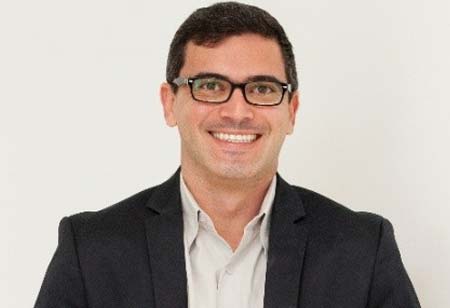ThiagoJube is an Industrial Production Manager with over 20 years in the food industry. He graduated in Food Engineering from UFGo/Brazil and holds an MBA in Business Management from FGV, providing him with a robust foundation in industrial operations. His expertise spans team coordination, industrial production and maintenance, supply chain management, production planning, cost control, budgets, safety and compliance standards, and quality management systems like GMP/HACCP. Throughout his career, he developed strong skills in people management, quality control and regulatory compliance, leading multidisciplinary teams to achieve remarkable results.
1. What are your primary roles and responsibilities as the Production and Maintenance Manager at Barry Callebaut Group?
My responsibilities include participating in the unit's strategy development, creating specific objectives, allocating resources and developing action plans. I ensure compliance with standards and regulations, manage production and maintenance, and coordinate teams for efficiency. Establishing and monitoring budgets, performance and cost standards is crucial for financial viability. I prioritize team health and safety, propose and execute strategic investments, and oversee continuous quality and environmental improvement policies. Implementing continuous improvement systems like lean manufacturing and maintaining the food safety management system to ensure product integrity and consumer safety are also key duties.
2. What are the most prevalent challenges in the manufacturing sector, particularly in production and maintenance, and what strategies do you suggest to mitigate them?
To ensure smoother operations and higher product quality, cocoa manufacturers should implement the following strategies:
1.Maintaining Consistent Product Quality: Use rigorous quality control measures, advanced testing and monitoring technologies. Establish strong relationships with suppliers to secure a steady supply of high-quality raw cocoa beans.
2.Managing Equipment Reliability and Downtime: Adopt predictive maintenance strategies with IoT sensors and analytics for real-time equipment health monitoring. Conduct regular preventive maintenance and train staff on proper equipment use and troubleshooting.
"Navigating the complexities of the manufacturing sector requires a strategic, forward-thinking approach and a commitment to continuous improvement"
3.Ensuring Compliance with Food Safety Standards: Implement comprehensive food safety management systems like HACCP, regularly audit and update these systems and provide continuous employee training on food safety practices.
4.Handling Supply Chain Disruptions: Develop a robust supply chain management strategy by diversifying suppliers, maintaining a safe stock of critical raw materials and using advanced logistics planning tools to optimize operations.
5.Addressing Labor Shortages: Invest in employee development programs, offer competitive compensation and benefits, create a positive work environment and utilize automation and robotics to reduce reliance on manual labor.
These strategies help mitigate production and maintenance challenges in the cocoa manufacturing sector.
3. How have modern technologies influenced the manufacturing sector in recent years? Could you share specific examples of technologies that have had a significant impact at Barry Callebaut Group?
Barry Callebaut Group has adopted several modern technologies to enhance their operational efficiency, quality standards and sustainability:
1.Automation and Robotics: These technologies streamline production by handling tasks like sorting, roasting, and packaging cocoa beans. This reduces human error, increases throughput and improves worker safety and productivity through the automation of repetitive and physically demanding tasks.
2.Blockchain for Supply Chain Transparency: Blockchain technology enhances transparency and traceability in the cocoa supply chain. By recording every transaction and movement of cocoa beans from farm to factory, Barry Callebaut ensures supply chain integrity, verifies cocoa origins and promotes sustainable and ethical sourcing practices.
3.Advanced Quality Control Systems: Advanced technologies like Near-Infrared (NIR) spectroscopy allow rapid, non-destructive analysis of cocoa bean composition, ensuring the use of only the highest quality beans. This maintains consistent product quality and reduces waste.
4.Sustainable Processing Technologies: The company invests in energy-efficient machinery and processes to minimize water and energy consumption. They also use waste-to-energy systems to convert cocoa bean shells and other byproducts into renewable energy, supporting a circular economy.
These technologies have helped Barry Callebaut enhance operational efficiency, maintain high-quality standards, ensure sustainable practices and improve competitiveness in the cocoa manufacturing sector.
4. What future do you envision for manufacturing processes in an ever-evolving business landscape? How are you preparing Barry Callebaut Group to embrace and leverage these changes?
The future of manufacturing processes will increasingly be driven by digital transformation, sustainability and advanced technologies. Key trends and advancements anticipated to shape this future include:
Sustainability: Manufacturing will prioritize sustainability by reducing environmental impact through energy-efficient technologies, waste reduction and circular economy principles. Barry Callebaut is committed to sustainable practices by investing in energy-efficient machinery, waste-to-energy systems and renewable energy sources and by implementing sustainable sourcing practices to reduce their carbon footprint throughout the supply chain.
Supply Chain Integration: Technologies like blockchain and advanced logistics solutions will drive more integrated and transparent supply chains. This will enhance traceability, reduce risks and improve stakeholder collaboration. Barry Callebaut is adopting blockchain technology for supply chain transparency and traceability, ensuring ethical sourcing and verifying the origins of their cocoa. The company is also investing in advanced logistics solutions to optimize supply chain operations and improve efficiency.
By embracing these advancements, Barry Callebaut Group is well-prepared to leverage the opportunities of an evolving business landscape. Their proactive approach to digital transformation, sustainability and technological innovation ensures they remain at the forefront of the cocoa manufacturing sector, delivering high-quality products while maintaining a commitment to sustainability and operational excellence.
5. What advice would you offer to other senior leaders and CXOs on effectively navigating the complexities of the manufacturing sector?
Navigating the complexities of the manufacturing sector requires a strategic, forward-thinking approach and a commitment to continuous improvement. Here are some key areas to focus on:
• Embrace Digital Transformation
• Focus on Sustainability
• Invest in Talent Development
• Prioritize Quality and Compliance
• Adopt Agile and Lean Practices
• Stay Customer-Centric











